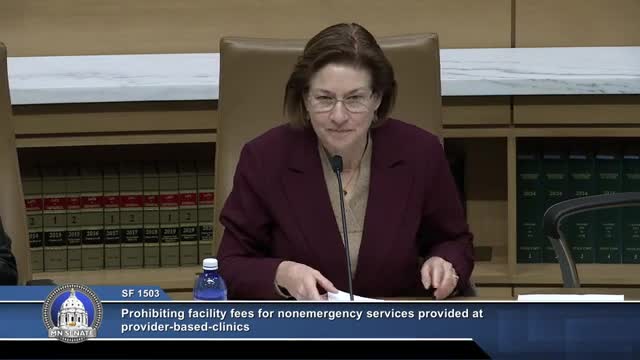Senate committee advances bill to ban hospital "facility fees" for many outpatient visits
Get AI-powered insights, summaries, and transcripts
Subscribe
Summary
The Senate Health and Human Services Committee advanced Senate File 1503, a bill that would prohibit hospital-affiliated clinics from charging separate facility fees for many nonemergency outpatient services, after author testimony and mixed responses from providers and advocates.
Senate File 1503, a measure to prohibit so-called facility fees charged by hospital-affiliated clinics for many nonemergency outpatient services, was recommended to pass as amended by the Minnesota Senate Health and Human Services Committee on Feb. 18, 2025 and was referred to the Judiciary Committee.
The bill’s author, Senator Uma Verbatin, told the committee the legislation would “eliminate facility fees” that she characterized as “predatory, unpredictable and very hard to avoid,” and that facility fees result from consolidation when hospitals acquire clinics and then add separate charges unrelated to the care delivered.
Verbatin said facility fees can appear for routine services—including preventive care, evaluation-and-management visits and telehealth—and sometimes exceed the professional charge for the visit. “These fees are driving up health care costs,” she said. She described the bill’s provisions, including a definition section, a prohibition on facility fees for nonemergency provider-based clinic services and telehealth, a reporting requirement to the Minnesota Department of Health (MDH), MDH rulemaking authority, and enforcement tools that would allow MDH and the attorney general to pursue violations.
The committee heard testimony from patients and health-sector groups. Melissa Finnegan, a constituent of the author, described a follow-up pediatric visit for her 4-year-old that produced a $423 outpatient hospital services charge in addition to a $201 professional charge despite the child never entering a hospital. “After several rounds of customer service calls…we learned that this charge was a facility fee,” Finnegan said, adding that the facility relied on a sign at the clinic as the required notice and that many families would not see such notice before an appointment.
Representatives of labor and hospitals gave opposing views. Ben Ballio of the Minnesota Nurses Association supported the bill, saying it would bring transparency and counter incentives for consolidation. By contrast, Joe Schindler, vice president of finance for the Minnesota Hospital Association, warned that nonprofit hospitals are under financial strain and said facility fees cover costs associated with equipment, maintenance and staffing. “Eliminating this long-standing funding source without alternatives does not make the cost go away,” Schindler said.
Supporters pointed to similar actions in other states: Connecticut has banned facility fees broadly, Colorado has limited them for preventive care, and Ohio has restricted telehealth facility fees. Senator Verbatin said MDH reporting and penalties would provide enforcement and transparency.
Committee members asked about who can be charged the fee and how MDH’s rulemaking authority would be exercised. Verbatin said any patient can be charged a facility fee if the clinic is associated with a hospital and described the MDH rulemaking as narrowly focused on identifying outpatient imaging or other services that can safely be provided outside hospitals.
The committee adopted an author’s A1 amendment by voice vote and then approved, by voice vote, a motion to recommend passage of SF 1503 as amended; committee minutes record an affirmative voice vote with no opposing voices recorded. The bill will next be considered by the Judiciary Committee.
Clarifying details from testimony include the example household billing amounts Finnegan provided: a $201 charge for professional services and a $423 facility fee for a single pediatric follow-up visit, and a citation to Minnesota statute 62J.0824 referenced by Finnegan regarding notice requirements for facility fees.
Supporters and opponents agreed that facility fees intersect with consolidation and with rural access: witnesses said facility fees can be especially burdensome for patients in Greater Minnesota who have fewer provider choices.
Senate File 1503 will now be considered by the Judiciary Committee; the committee record shows the measure advanced from HHS to Judiciary on Feb. 18, 2025.
